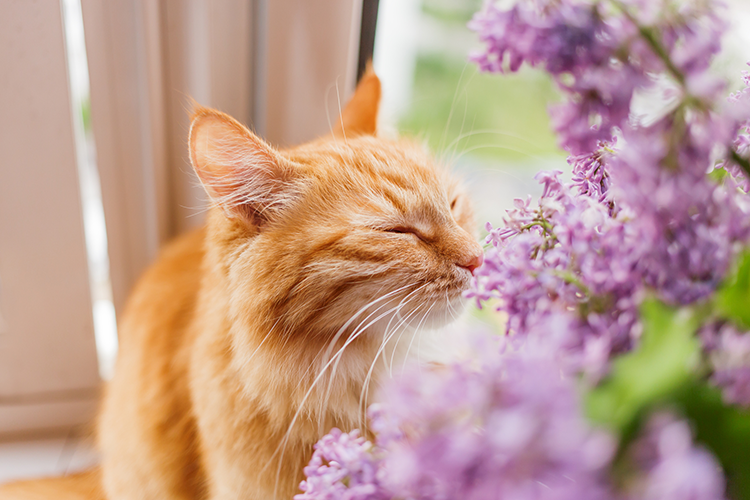At the end of May, many of us are buying extra flowers because the sun’s finally shining and we’re ready to celebrate! Unfortunately, many of the most common household flowers can be toxic to our feline friends. They’re pretty to look at, but you must beware of your kitty getting too close or eating them. So before you head off to the flower shop down the road, make sure what you’re buying to brighten up your place is safe for your kitty!
 1. Chrysanthemum
1. Chrysanthemum
Common Names: Mums, Daisies.
What Makes It Toxic: Sesquiterpene, lactones, pyrethrins and other potential irritants.
Signs of Poisoning: Vomiting, diarrhea, hyper-salivation, incoordination, dermatitis.
 2. Carnation
2. Carnation
Common Names: Pinks, Wild Carnation, Sweet William.
What Makes It Toxic: Unknown irritant.
Signs of Poisoning: Mild gastrointestinal signs and mild dermatitis.
 3. Daffodil
3. Daffodil
Other Common Names: Narcissus, Jonquil, Paper White
What Makes It Toxic: Lycorine and other alkaloids; The bulbs are the most poisonous.
Signs of Poisoning: Vomiting, salvation, diarrhea. Large ingestions cause convulsions, low blood pressure, tremors and cardiac arrhythmias.

4. Everlasting Pea
Common name: Sweet Pea, Perennial Pea
What Makes It Toxic: Aminoproprionitrite
Signs of Poisoning: Weakness, lethargy, pacing, head pressing, tremors, seizures and possibly death.
 5. Lily
5. Lily
Lilies are one of the most dangerous plants for cats. If left untreated, lily toxicity can kill a cat as soon as 18 hours after exposure. Cats are only species known to be affected. 1 in 5 toxic plant exposures to pets are due to lilies.
What Makes It Toxic: The irritant is unknown for most lilies but for the Peace Lily, Insoluble calcium oxalates make them poisonous.
Signs of Poisoning: Vomiting, inappetence, lethargy, kidney failure, and death is possible.
 6. Poinsettia
6. Poinsettia
The Poinsettia is generally over-rated for toxicity, but it’s always better safe than sorry.
What Makes It Toxic: Irritant sap
Signs of Poisoning: Irritation to the mouth and stomach, sometimes causing vomiting.
7. Foxglove
What Makes It Toxic: Cardiac glycosides
Signs of Poisoning: Cardiac arrhythmias, vomiting, diarrhea, weakness, cardiac failure, death.
 8. Tulips
8. Tulips
What Makes It Toxic: Tulipalin A and B; the bulbs are the most poisonous similar to the Daffodil.
Signs of Poisoning: Vomiting, depression, diarrhea, hyper-salivation.
 9. Rhododendron
9. Rhododendron
Common Names: Rosebay, Azalea
What Makes It Toxic: Grayantoxins
Signs of Poisoning: Vomiting, drooling, diarrhea, weakness and depression of the central nervous system. Severe poisoning could ultimately lead to coma and death from cardiovascular collapse. Eating even a few leaves can cause serious problems!
 10. Geraniums
10. Geraniums
Cats are most sensitive to this.
What Makes It Toxic: Essential Oils
Signs of Poisoning: Primarily GI upset. Could also see ataxia, muscle weakness, depression or hypothermia in larger exposures.
What to Do
Since many plants are irritants, especially for the gastrointestinal tract, most symptoms seen will be the result of irritation or inflammation, such as redness, swelling, or itchiness of the skin or mouth.
If you see your cat eating toxic flowers or if you think your cat ate one within the past 1 to 2 hours, you can do the following before you take him to your veterinarian:
- Remove any plant material from the hair and skin.
- If necessary, wash the cat with warm water and a little non-irritating dish soap.
- Identify what plant they may have eaten. If you don’t know what kind of plant it is and you can bring it with you, do so. Veterinarians don’t receive much training in plant identification, but every effort needs to be made to identify the plant. If your cat has vomited at all, try to collect some it for the doctor.
- Call the Pet Poison Helpline at 1-855-213-6680.
Now that you know what to avoid, check out this list of plants that your kitties will love!







